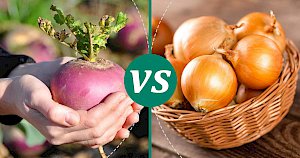Onion vs Turnip: Nutrition, Calories & Protein Compared


Onion vs Turnip
Nutrition Facts
Serving size:
change
5g10g15g20g30g40g50g60g80g100g120g140g160g180g200g220g250g300g350g400g450g500g600g700g800g900g1000g
1oz2oz3oz4oz5oz6oz7oz8oz10oz12oz15oz20oz25oz30oz35oz40oz50oz
Amount Per Serving:
Serving size:
change
5g10g15g20g30g40g50g60g80g100g120g140g160g180g200g220g250g300g350g400g450g500g600g700g800g900g1000g
1oz2oz3oz4oz5oz6oz7oz8oz10oz12oz15oz20oz25oz30oz35oz40oz50oz
Amount Per Serving:
Onion vs Turnip 100g Compare
| per 100g | Onion | Turnip |
|---|---|---|
| Calories | 40 | 28 |
| Carbohydrates | 9.34 g | 6.43 g |
| Fat | 0.1 g | 0.1 g |
| Dietary fiber | 1.7 g | 1.8 g |
| Protein | 1.1 g | 0.9 g |
| Calcium | 23 mg | 30 mg |
| Iron | 0.21 mg | 0.3 mg |
| Magnessium | 10 mg | 11 mg |
| Potassium | 146 mg | 233 mg |
| Sodium | 4 mg | 39 mg |
| Vitaminium B1 (Thiamine) | 0.046 mg | 0.04 mg |
| Vitaminium B2 (riboflavin) | 0.027 mg | 0.03 mg |
| Vitaminium B3 (Niacin) | 0.116 mg | 0.4 mg |
| Vitaminium B5 | 0.123 mg | 0.2 mg |
| Vitaminium B6 | 0.12 mg | 0.09 mg |
| Vitaminium B9 (Folic acid) | 0.019 mg | 15 mg |
| Vitaminium C | 7.4 mg | 21 mg |
| Vitaminium E | 0.02 mg | 0.03 mg |
Discovering the Nutritional Profiles of Onions and Turnips
Onions and turnips, both staples in kitchens around the world, offer more than just flavor to our dishes. These vegetables, deeply rooted in history and culinary traditions, bring a plethora of nutritional benefits to the table. Before we delve into the "Onion vs Turnip" debate, let's explore some interesting facts about these two vegetables that might surprise you.
Onions, with their pungent aroma and layered structure, have been cultivated for over 5,000 years. Not only do they add a unique flavor to a variety of dishes, but they have also been used historically for medicinal purposes. Turnips, on the other hand, are not as universally loved as onions, but they have been an important food source since prehistoric times, especially in Europe and Asia. These root vegetables can be eaten raw, cooked, or even pickled.
Nutritional Breakdown: Onion vs. Turnip
When comparing the nutritional content of onions and turnips, it's clear that both vegetables are low in calories but rich in vitamins and minerals. Here's a closer look at what each offers:
- Calories: Onions contain slightly more calories per 100g (40) compared to turnips (28).
- Carbohydrates and Fiber: Onions have more carbohydrates (9.34g) than turnips (6.43g), but both are good sources of dietary fiber.
- Vitamins and Minerals: Turnips edge out onions in vitamin C content, providing 21mg per 100g, compared to onions which offer 7.4mg. They also have higher levels of calcium and potassium, making them a great choice for supporting bone health and blood pressure regulation.
Both vegetables are virtually fat-free and contain a variety of B-vitamins, essential for energy metabolism. Moreover, they are free from cholesterol, making them heart-healthy options.
What Does This Mean for Your Diet?
Choosing between onions and turnips doesn't have to be a binary decision. Both vegetables offer unique flavors and nutritional profiles that can complement any diet. Onions, with their higher sugar content, can add a touch of sweetness to dishes, while turnips, with their higher vitamin C and potassium levels, offer excellent nutritional benefits that may be particularly appealing for those looking to boost their immune system or manage blood pressure.
Ultimately, the choice between onions and turnips should come down to personal preference and dietary needs. Incorporating a variety of vegetables into your diet is key to obtaining a wide range of nutrients. Whether you're sautéing onions for a flavorful base or roasting turnips for a hearty side, both vegetables are versatile and nutritious additions to your meals.
In conclusion, while onions and turnips may differ in taste and nutritional content, they both deserve a place in your kitchen. By understanding the unique benefits each vegetable offers, you can make informed choices to enrich your diet and enjoy the diverse flavors they bring to your culinary creations.
Onion 100g
40kcalCalories source
- 88% CARBS.
- 10% PROTEIN
- 2% FAT
Turnip 100g
28kcalCalories source
- 85% CARBS
- 12% PROTEIN
- 3% FAT
Compares of onion
- Onion vs Asparagus
- Onion vs Beetroot
- Onion vs Bitter Melon
- Onion vs Bok Choy
- Onion vs Broccoli
- Onion vs Butternut Squash
- see all compares of onion
Compares of turnip
Read also:
- Calories from Onion
- Calories of Parsnips
- Calories in Peas
- Potato calories per 100g
- Pumpkin protein per 100g
- How many calories does purslane have?
- Calories in a half of radish
- Calories in whole radish
- Calories for one, two or more radishes
- Calories in handful of radishes
- Calories in bunch of radishes
- How much protein in rhubarb?
Marcin Piotrowicz
calories-info.com creator
Healthy diet and healthy lifestyle promoter
Add comment